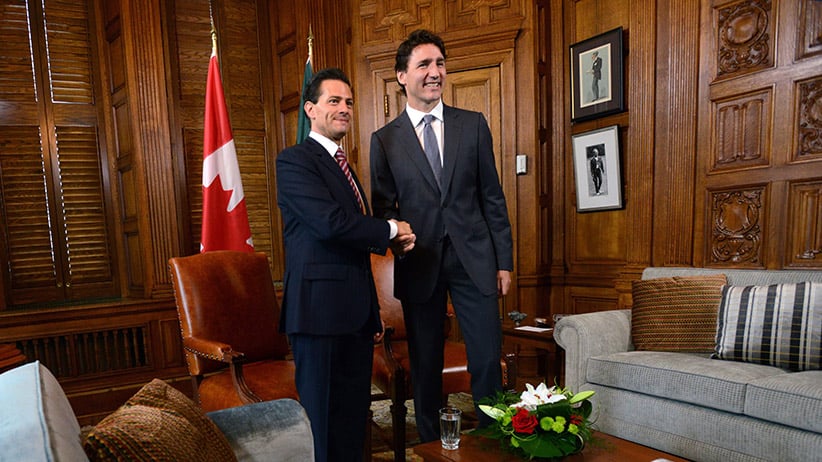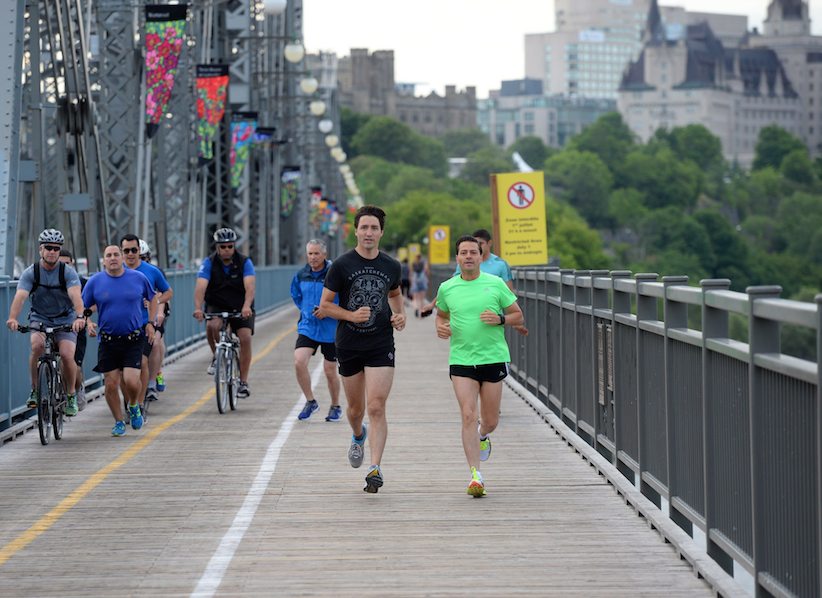Is now the time for Mexico and Canada to become the ‘two amigos?’
Mexico’s ambassador to Canada Agustín García-López on the two countries’ relations, from lifting visas to ending a beef ban
Canada’s Prime Minister Justin Trudeau (right) shakes hands with Mexico’s President Enrique Pena Nieto following a Q&A with youth at the Museum of Nature, on Tuesday, June 28, 2016 in Ottawa. (Justin Tang/CP)
Share

While the United States hears calls to wall off Mexicans, Canada is welcoming them more than ever. On Dec. 1, the Canadian government lifted the visa requirement for Mexican citizens traveling to Canada for up to six months, including for tourists, business people, and diplomats. (The visa was implemented in 2009 under the Stephen Harper government. Mexico does not require Canadian visitors to have visas). The change was announced on Oct. 1; the same day, Mexico lifted its controversial ban on imports of Canadian beef. Maclean’s spoke with the Mexican ambassador to Canada, Agustín García-López, about the growing friendship between Canada and Mexico.
Q: Given Trump’s promise to isolate Mexico from the United States, are Mexico and Canada becoming the two amigos?
A: The “three amigos” must remain so. In campaigns, [candidates] say many things. You have a purpose, which is to get voted. We have to wait on whether the president-elect will be the president, and the government has to look at its own relationships. Already the announcement has been made different than the pronunciations in the campaign. The wisest thing is just to wait. There are too many “ifs.”
But what I can tell you is that the momentum between the Mexico-Canada relationship is already there. It’s happening. It’s a very close circle. We have what’s called the Canada-Mexico Partnership. This year we met in Ottawa. We were 180 people sitting on both sides of the table. We do more than $32 billion in trade. You are our second-biggest partner in tourism, with almost two million tourists a year.
Q: So, no more travel visas will be necessary for Mexicans entering Canada. What will be the immediate impact?
A: In dollar terms, it will be wonderful for you. In 2009, we had 300,000 Mexicans coming to Canada. After the visa was imposed, we had only 120,000. First of all, it was an expensive process—it was around US$100 per traveller, and of course it went up if you had a family. It was also a process that had a very lengthy questionnaire, and questions that were in all kinds of realms, even in terms of your parents, your sons, your family.
Also you had to have your passport taken from you. That would be from one week to two, three or four weeks. Many businessmen, many investors, academics, people from think tanks wouldn’t be able to do it because they are travelling all the time and cannot just leave the passport there.
I have friends, for example, that would come to Whistler every year, one particular gentleman who loves skiing and loves Whistler. He had been there for years. He had an apartment, but [after 2009], when he tried to get a visa, it was so lengthy … he decided to go elsewhere and sell his apartment. I know for a fact that Whistler has been very [affected] by the fact that Mexicans were not freely coming.
Q: How did this change come about?
A: Your Prime Minister himself made an offer in his campaign. From the beginning, he had a very good dialogue and a good chemistry with my president, Enrique Peña Nieto. They saw each other very soon [after the Canadian election] in Turkey at the G20, then at the COP21 in Paris. My president was the first head of state invited here to Canada.
Q: “Good chemistry” is right. Trudeau and President Peña Nieto famously went jogging together in Ottawa. What prompted that activity?
A: They themselves talked about it on a telephone conversation. When you have ideas like that, it means you’re talking to a friend. This is something we wouldn’t have dared to even think about. I would’ve loved to be part of it but I was not allowed—first of all because I’m a lousy jogger. They had to have their security, protocol people. They had to be good joggers because they had to pick up the pace.

Q: Considering travel in the other direction, there was a shooting at a hotel in Cancun last week. Should Canadian travellers to Mexico be concerned?
A: Of course we have security issues. But to tell you the truth, by the sheer number [of tourists], really we almost do not have cases on that front. The places tourists go are very secure. I [met] the CEO of WestJet. The flow is increasing. Now they have 10 flights to Mexico.
Q: Right when the visa change was announced in October, Mexico lifted its ban on Canadian beef. Was this a return favour?
A: Not an exchange, no. Our animal sanitary institutions worked together. We came here with our technicians. We went to the centres where you produce meat. I have just gone to the Edmonton agricultural farm fair, and I saw your wonderful beef. I saw beautiful red Anguses and black Anguses and Charolais and Herefords. I’m quite a tall guy. They were higher than myself.
I also watched your rodeo, and I also saw all the Mexicans that were there. You may be surprised to know 60 per cent of the stock was bought by Mexican cattlemen. They think the technology you use in Canada is the best in the world. We think your animals are the best for our breeding requirements. And they like doing business with you because you’re friendly and respectful. [At the fair in Edmonton,] you have to wear a black hat. Once you put it on, they have a steam machine so they can mould the wings of the hat, so you look the right way, so you can be really cute. I wanted to be an ambassador of cattlemen. Since I was in Canada, I had to abide by the Canadian cowboy rules.
Q: How are you celebrating the positive developments in Mexico-Canada relations?
A: I know the Canadian embassy in Mexico will [make] this announcement and [have] a party. Normally you do champagne, but in this case I will have a tequila to begin with and then a good Ontario or British Columbia wine—to go with my Alberta beef tacos.